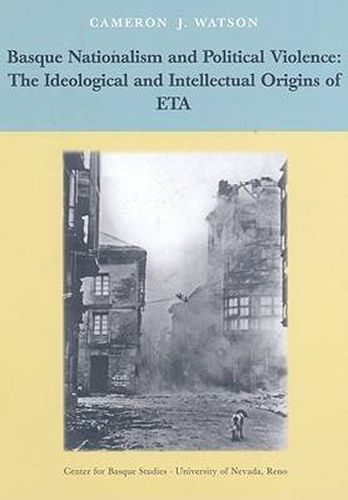Readings Newsletter
Become a Readings Member to make your shopping experience even easier.
Sign in or sign up for free!
You’re not far away from qualifying for FREE standard shipping within Australia
You’ve qualified for FREE standard shipping within Australia
The cart is loading…






Basque Nationalism and Political Violence examines the relationship between ideas and action through a historical account of how images of violence and warfare pervaded the discourse of Basque nationalism. These images were created principally through the preponderant influence of the Partido Nacionalista Vasco (PNV or Basque Nationalist Party) - from its inception in the 1890s through the mid-twentieth century. Cameron Watson argues that a culture of political violence emerged within the Basque nationalist movement that eventually resulted in the 1959 creation of ETA (Euskadi ta Askatasuna, Basque Country and Freedom).The undertone of violent struggle in Basque nationalism was itself a response to the aggressive nationalism of Spain, a country whose problematic transition to modernity in the nineteenth and twentieth centuries engendered multiple forms of social, political, and structural violence within its own borders and beyond. Watson views the rise of political violence as a present-day expression of the Basques’ problematic dialogue with modern Spain. He does not limit his explanation of ETA’s emergence to the Spanish context alone. Rather, he emphasizes the transnational context in which nationalist movements emerge and develop. At varying times, the national struggles of Cuba, Morocco, and Ireland were extremely influential in the Basque case. Moreover, the origins of ETA were strongly influenced by post-World War II intellectual currents, from existentialism to the liberating theories of anticolonial nationalist movements.
$9.00 standard shipping within Australia
FREE standard shipping within Australia for orders over $100.00
Express & International shipping calculated at checkout
Basque Nationalism and Political Violence examines the relationship between ideas and action through a historical account of how images of violence and warfare pervaded the discourse of Basque nationalism. These images were created principally through the preponderant influence of the Partido Nacionalista Vasco (PNV or Basque Nationalist Party) - from its inception in the 1890s through the mid-twentieth century. Cameron Watson argues that a culture of political violence emerged within the Basque nationalist movement that eventually resulted in the 1959 creation of ETA (Euskadi ta Askatasuna, Basque Country and Freedom).The undertone of violent struggle in Basque nationalism was itself a response to the aggressive nationalism of Spain, a country whose problematic transition to modernity in the nineteenth and twentieth centuries engendered multiple forms of social, political, and structural violence within its own borders and beyond. Watson views the rise of political violence as a present-day expression of the Basques’ problematic dialogue with modern Spain. He does not limit his explanation of ETA’s emergence to the Spanish context alone. Rather, he emphasizes the transnational context in which nationalist movements emerge and develop. At varying times, the national struggles of Cuba, Morocco, and Ireland were extremely influential in the Basque case. Moreover, the origins of ETA were strongly influenced by post-World War II intellectual currents, from existentialism to the liberating theories of anticolonial nationalist movements.